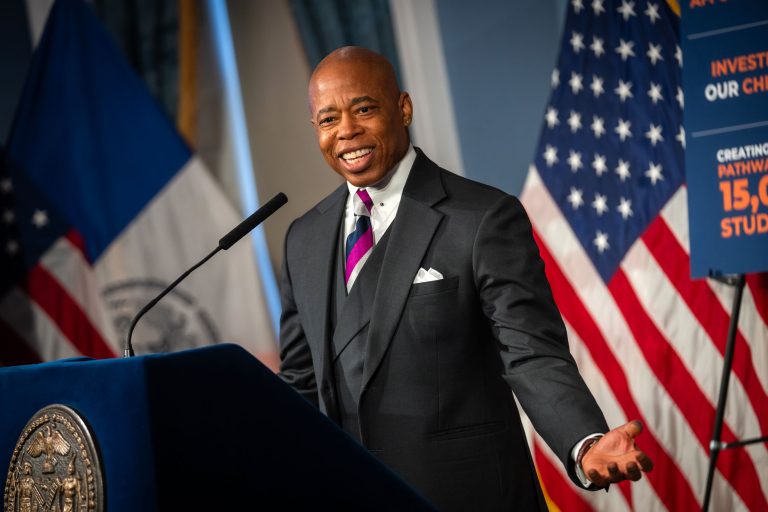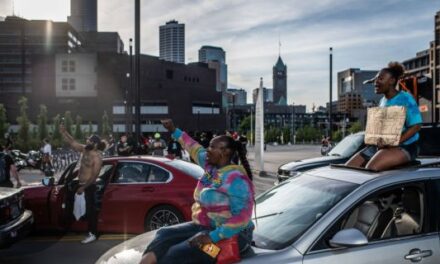
Shortly after it was known that Eric Adams is facing federal charges for corruption, something happened that could give him a get-out-of-jail card. Donald Trump, a master at evading corruption charges, claimed victory in his bid for a second term in the white house. Adams, a Democrat, and Trump, a Republican, are both entrenched law-and-order advocates who are accused of corruption. They are expected to meet soon.
For Adams, this could mean a get-out-of-jail-free card and a clearer path toward a second term as mayor. For Trump, it could relieve some of the antipathy toward him emanating from his hometown and the African-American community. More broadly, a reconciliation between Adams and Trump could allow Adams to continue dodging criticisms for the NYPD’s overly aggressive policing and the City’s treatment of migrants, and it could boost the mayor’s chances for a second term. At the same time, a Trump endorsement of Adams may very well help Trump continue to thumb his nose at the New York-based opposition.
Many progressives seem prepared to reject Adams for a second term for various reasons: The mayor responded to the chronic lack of affordable housing with regulatory giveaways to the real-estate industry, such as his “City of Yes” package that would loosen zoning restrictions. He has refused to back protections for low- and moderate-income tenants. He confronted the migrant influx with a haphazard series of temporary measures followed by budget cuts and yet more aggressive policing.
Adams also stacked his administration with a disproportionate number of friends and obedient cronies, some of whom are also the targets of corruption charges. This looks somewhat like the Trump regime, which has also been stacked with friends and loyalists.
A reconciliation between Adams and Trump could boost the mayor’s chances for a second term.
To be fair, corruption has historically been a chronic element in New York City government. So it is perhaps not surprising that Adams crossed the line and flagrantly dismissed responsible criticisms of his policies from the City Council and many community, civic, civil rights and housing organizations.
Policing & Real Estate
To be more specific, the problem with both Adams and Trump has been their blind obedience to policing and real-estate development. This kind of corruption has long been embedded in New York City’s economy and governance system. In addition, Adams has been overtly hostile when reacting to critics of his public and private peccadillos. But if we look carefully beyond the mayor’s bluster, we can see the deeper, historical corruption of the political class that helped to lift him up from being a cop who openly exposed racism in the NYPD in the 1990s to a mayor who reinforced the impunity of the police force — choosing at the same time to ignore charges of racist policing.
The longtime faith of Eric Adams in policing parallels his service to Brooklyn’s Democratic Party, one of the most powerful institutions in the city’s most populous borough. In the past the party leadership traditionally centered its power on the borough president’s office, which Adams ran for two terms. Borough Hall is typically where politicians learn the importance of obeisance to the party, how to sustain close ties with the real-estate industry, and what it takes to protect the more exclusive and powerful neighborhood enclaves. Borough presidents have traditionally assuaged criticism of the institutional neglect of low-income communities of color by showering them with the little bit of patronage funding these officials control.
The local press tends to underestimate the role of the Democratic Party machinery citywide, but the “Brooklyn machine” stands out for its insular power and subservience to real estate. (The Democrats rule in all boroughs except Staten Island, where conservatives tend to outnumber liberals and the Republican Party rules). But it makes no sense to simply characterize Adams’ party as “liberal” or “conservative.” He has sought to define himself as an independent force (if not an “independent”) who is able to work in the public interest. After his election as mayor, however, he elevated the same kind of disciplined loyalty to the party apparatus that he had challenged when he fought for racial equality in the NYPD.
On the policy front, the bankruptcy of the Adams administration is nowhere more clear than in his City of Yes proposal, which would alter the city’s zoning rules to open up new opportunities for real estate investment around the city. The City of Yes loyally follows the myth of supply-side economics, which pushes the false claim that homelessness and the lack of affordable housing can be resolved by simply building more housing. It’s pure supply-side nonsense, and it hasn’t worked for at least the last century. Having saturated the luxury market in Manhattan and the Brooklyn and Queens waterfronts and opened up new upper-income enclaves in portions of the South Bronx, big real estate wants more. And it wants to strip tenants of legal protections.
The City of Yes, if implemented, will help advance the real-estate industry’s takeover of neighborhoods across the city. It will undermine the role of community boards, community-based housing advocates and the drive for truly affordable housing — which can only be provided with more government subsidies, improved services and stronger regulation of the private market.
As many progressives, including myself, seek to reject another Adams term, I am mindful that he is only the second Black mayor to be elected in the city’s entire history. The first was David Dinkins, who served only one term in the face of a racist backlash led by none other than Rudolph Giuliani, Trump’s pal who used venomous rhetoric against Dinkins and spoke at an anti-Dinkins police riot outside City Hall.
Whatever we decide to do now, we must not let that history repeat itself. Fortunately, we have a wide potential field of candidates who have served in government and demonstrated a commitment to economic and racial justice.
Tom Angotti is professor emeritus at City University of New York and an adjunct professor at Parsons/The New School.




